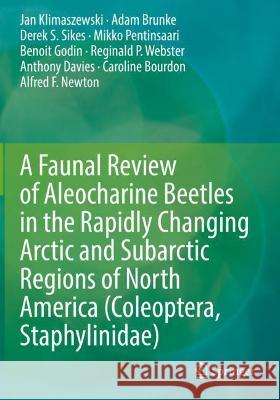A Faunal Review of Aleocharine Beetles in the Rapidly Changing Arctic and Subarctic Regions of North America (Coleoptera, Staphylinidae) » książka
topmenu
A Faunal Review of Aleocharine Beetles in the Rapidly Changing Arctic and Subarctic Regions of North America (Coleoptera, Staphylinidae)
ISBN-13: 9783030681937 / Angielski / Miękka / 2022
A Faunal Review of Aleocharine Beetles in the Rapidly Changing Arctic and Subarctic Regions of North America (Coleoptera, Staphylinidae)
ISBN-13: 9783030681937 / Angielski / Miękka / 2022
cena 693,97 zł
(netto: 660,92 VAT: 5%)
Najniższa cena z 30 dni: 689,15 zł
(netto: 660,92 VAT: 5%)
Najniższa cena z 30 dni: 689,15 zł
Termin realizacji zamówienia:
ok. 20 dni roboczych.
ok. 20 dni roboczych.
Darmowa dostawa!
Arctic and Subarctic North America is particularly affected by climate change, where average temperatures are rising three times faster than the global average. Documenting the changing climate/environment of the north requires a structured knowledge of indicator taxa that reflect the effects of climate changes.
Aleocharine beetles are a dominant group of forest insects, which are being used in many projects as indicators of environmental change. Many species are forest specialists restricted to certain microhabitats, some are generalists and others are open habitat specialists. They represent many ecological niches and, as such, are good indicators for many other species as well. The majority of Canadian aleocharine beetle species (about 600 spp.) has been studied and published by Jan Klimaszewski et al. (2018, 2020), mainly from southern, central, and western Canada, while the northern taxa remain poorly known and documented.
The aim of the present book is to summarize the knowledge on this insect group in the Arctic and Subarctic North America and to provide a diagnostic and ecological tool for scientists studying and monitoring insects in northern Canada and Alaska. The book includes a review of the literature, information on 238 species and their habitats, taxonomic review, images, and identification tools.











